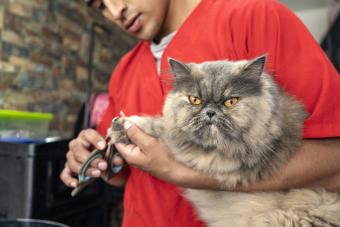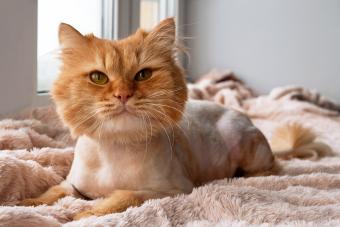
Cat dandruff is a common condition for cats with dry skin, especially in winter as dryer air and forced heat are all around. There are several effective cat dandruff remedies you can use to keep your kitty flake-free. Discover a variety of ways to get rid of your cat's dandruff, as well as solutions to prevent future problems.
Cat Dander vs. Cat Dandruff
When applying any treatment, you should first make sure you know the difference between cat dandruff and dander. Dander is too small for you to see, so if you see white flakes on your cat's fur, this is most likely dandruff. However, a cat can have both, as dander occurs naturally as part of a cat's regular grooming routine.
Related: 9 Cat Skin Problems You Shouldn’t Ignore (With Pictures)
Simple Ways to Get Rid of Cat Dandruff
Before you try any cat dandruff remedies, make sure you visit your veterinarian to rule out any serious medical conditions. Dr. Learn cautions, "Any skin problem should be checked out by a vet. It may be a simple allergy or fleas, but it could be a sign of a serious health problem such as cancer or liver disease." Once your vet's cleared kitty:
1. Add Fish Oil Supplements
Dr. Amy Learn with Animal Behavior Wellness Center says that she "definitely recommends fish oils for cats with dandruff." You can find fish oil supplements in powder, tablet, or liquid formulas. You can also simply add fish oil to your cat's diet by asking your veterinarian which vitamin they recommend and popping a capsule onto their food.
Keep in mind that to much of certain canned fish, like tuna or salmon, can contain toxic amounts of salt for cats.
2. Engage in Daily Brushing
Cats with mild to moderate cases of dandruff can show significant improvement with just a daily brushing. Massaging gently can also help, as it improves blood circulation, which promotes healthy skin and fur.

Some cats suffer from dandruff because they are unable to groom themselves, so brushing may be enough to remove dandruff entirely, but you'll want to talk to your veterinarian about how to make your cat more comfortable if they've stopped grooming entirely.
3. Bathe Your Cat
Giving your cat regular baths can improve dandruff, though this doesn't always work. If you bathe them too often with a regular shampoo, it can dry out their skin even more. Look for a shampoo designed specifically for cats with dandruff that has additional moisturizers like fish oils and oatmeal to help with the condition.
Related: 5 Reasons Cats Hate Water & How to Get Them to Like It
4. Try Skin Conditioners
Using a skin moisturizer made for cats can help cats with dry skin, which is an underlying cause of dandruff. Dr. Learn says, "I love a mousse from CEVA called Seborrhea. You rub it in and it nourishes the skin and helps to rebuild the brick and mortar structure of the cells to restore a healthy barrier."
Olive oil is another skin conditioner you can use on cats with dandruff. In addition to using it as a supplement in your cat's food, you can warm some regular (non-flavored) olive oil and gently massage it into your cat's skin. The oil shouldn't be heated so that it's too hot to the touch but just warm enough to help ease it onto your cat's skin for a relaxing massage.
Another type of skin conditioner for cats comes in a spray form. While these are not specifically cat dandruff sprays, these products can be helpful for dry and irritated skin. Speak with your groomer or veterinarian to find out what products they recommend.
5. Consider Their Diet
A cat's diet can trigger or exacerbate dandruff. Look for a food that is designed to promote healthy skin and has supplements added to it, such as fish oil and other sources of Omega 3 fatty acids. Diets that are higher in protein and with more quality protein sources can also improve a cat's skin.
Some cats on a dry-only diet can see improvement if you add more wet food into their daily diet. If you already use a mix of wet and dry food, try switching to a wet food only diet to see if that has an effect on the dandruff.

Related: 11 Reasons for Dry Skin in Cats & 6 Home Remedies to Help
6. Remove Food Allergens
Dandruff can also result from a food allergy. If you are able to identify one or more ingredients that seem to cause your cat to get dandruff, steer clear of those ingredients. Certain grains and proteins are often the culprits behind food allergies in cats. Changing to a food your cat does not have a reaction to can go a long way toward reducing dandruff.
7. Work Toward a Healthy Weight (But Not Too Fast)
Obesity in cats can be a factor in the presence of dandruff. Your cat should be a healthy weight regardless of whether they have dandruff problem, so if your cat is a bit on the rotund side, discuss nutritional options with your vet designed to promote weight loss. You can also try to add in more exercise to your cat's day to increase their caloric burn, such as playing with a wand teaser or fishing pole toy with you. Just keep in mind that losing weight too fast can be lethal for cats. Make sure your veterinarian works with you on a weight-loss plan.
8. Add Moisture
Is your cat drinking enough water? Make sure the water bowl is always full and provide alternate methods for your cat to get water. Some cats prefer drinking from fountains, so using one could increase your pet's water intake. You may also want to install a humidifier in your house. This can be helpful to your health as well as that of your cat.
Related: Yes, Cats Should Be Drinking Water! Here's How Much
9. Keep Your Cat Inside
Because dandruff is often caused by dry skin, cats can develop dandruff from getting a sunburn. Keeping your cats inside can reduce the chance they'll get sunburned, though indoor cats are still at risk for sunburn.
10. Reduce Stress
Stress and anxiety can cause a cat to develop dandruff. If your cat has suddenly developed dandruff after a specific event, such as moving, bringing in a new pet or a baby, or other changes in the environment, you might consider that your cat's dandruff is due to stress. In this case, try solutions designed to help calm your cat. Examples include:

- Allowing your cat space to retreat when they feel overwhelmed
- Providing your cat with enriching activities, like playing with toys
- Setting up some places for them to climb, such as cat trees
If your cat continues to be anxious, consult your veterinarian or a qualified behavior professional.
See Your Veterinarian Again
Dandruff can be the first sign of a more serious medical condition, especially if it's lingering. Your veterinarian is also a great source for product recommendations for dandruff shampoos, skin moisturizers, supplements, and skin-friendly diets.







